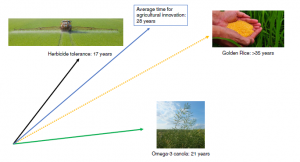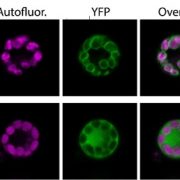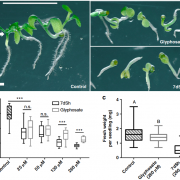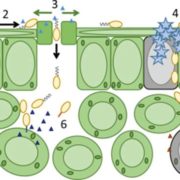Review: The challenges of delivering genetically modified crops with nutritional enhancement traits (Nature Plants) ($)
 Despite the widespread success of genetically modified (GM) crops resistant to herbicides and insect herbivory, GM food crops with nutritional enhancement traits remain on the fringes of commercial agriculture. In this review, Napier et al. examine the current state of GM food crops and the obstacles that hinder the continued development of such traits in Golden Rice and omega-3 fish oil crops. Golden Rice is modified with a daffodil phytoene synthase gene to accumulate beta-carotene in its endosperm and Omega-3 fish oil crops are engineered with several gene sequences from marine algae to synthesize two types of fatty acids most often obtained from ocean fish. Golden Rice has humanitarian value in that it was created as a source of vitamin A for those with blindness-causing deficiencies, while the omega-3 crops provide a sustainable and economical solution to harvesting oil from fish. Ethical concerns surrounding profiting from peoples’ suffering pose financial hurdles to the success of Golden Rice, in addition to the barriers of securing intellectual property rights and navigating regulatory approval processes. The omega-3 crops require more complicated genetic editing, resulting in the potential for even more complex patent disputes and regulatory approval processes. Both are damaged by negative publicity and minimal public acceptance and understanding of GM crops. Agricultural innovations tend to be slow going, however the success of herbicide-resistant GM crops suggests that in time, commercial agriculture and the general public can come to embrace nutritionally-enhanced GM crops. (Summary by Rebecca Hayes) Nature Plants 10.1038/s41477-019-0430-z
Despite the widespread success of genetically modified (GM) crops resistant to herbicides and insect herbivory, GM food crops with nutritional enhancement traits remain on the fringes of commercial agriculture. In this review, Napier et al. examine the current state of GM food crops and the obstacles that hinder the continued development of such traits in Golden Rice and omega-3 fish oil crops. Golden Rice is modified with a daffodil phytoene synthase gene to accumulate beta-carotene in its endosperm and Omega-3 fish oil crops are engineered with several gene sequences from marine algae to synthesize two types of fatty acids most often obtained from ocean fish. Golden Rice has humanitarian value in that it was created as a source of vitamin A for those with blindness-causing deficiencies, while the omega-3 crops provide a sustainable and economical solution to harvesting oil from fish. Ethical concerns surrounding profiting from peoples’ suffering pose financial hurdles to the success of Golden Rice, in addition to the barriers of securing intellectual property rights and navigating regulatory approval processes. The omega-3 crops require more complicated genetic editing, resulting in the potential for even more complex patent disputes and regulatory approval processes. Both are damaged by negative publicity and minimal public acceptance and understanding of GM crops. Agricultural innovations tend to be slow going, however the success of herbicide-resistant GM crops suggests that in time, commercial agriculture and the general public can come to embrace nutritionally-enhanced GM crops. (Summary by Rebecca Hayes) Nature Plants 10.1038/s41477-019-0430-z









